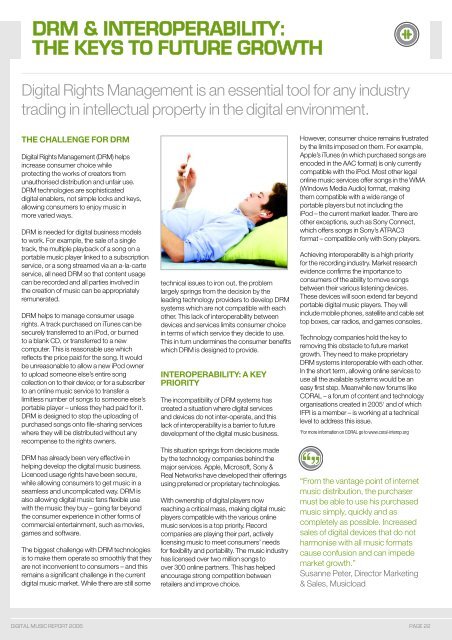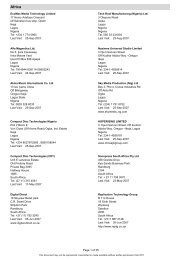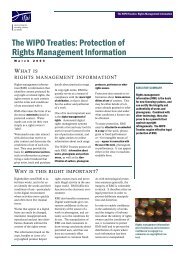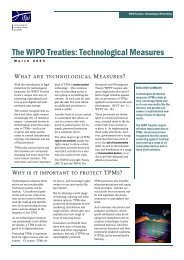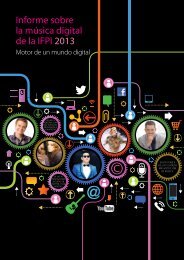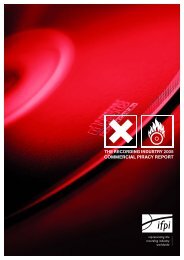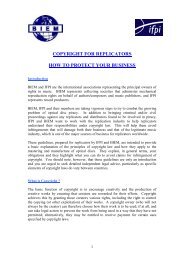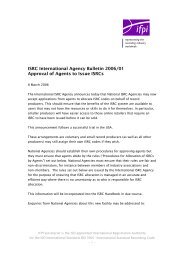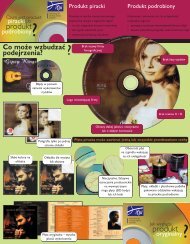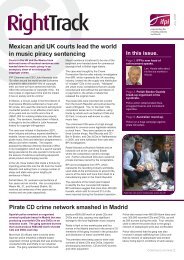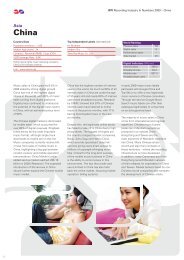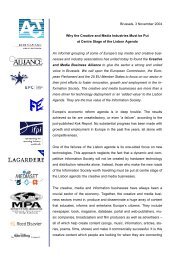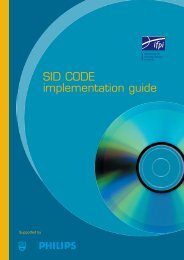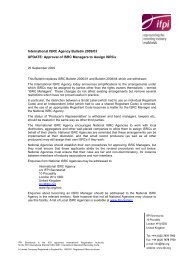2006 - IFPI
2006 - IFPI
2006 - IFPI
Create successful ePaper yourself
Turn your PDF publications into a flip-book with our unique Google optimized e-Paper software.
DRM & INTEROPERABILITY:<br />
THE KEYS TO FUTURE GROWTH<br />
Digital Rights Management is an essential tool for any industry<br />
trading in intellectual property in the digital environment.<br />
THE CHALLENGE FOR DRM<br />
Digital Rights Management (DRM) helps<br />
increase consumer choice while<br />
protecting the works of creators from<br />
unauthorised distribution and unfair use.<br />
DRM technologies are sophisticated<br />
digital enablers, not simple locks and keys,<br />
allowing consumers to enjoy music in<br />
more varied ways.<br />
DRM is needed for digital business models<br />
to work. For example, the sale of a single<br />
track, the multiple playback of a song on a<br />
portable music player linked to a subscription<br />
service, or a song streamed via an a-la-carte<br />
service, all need DRM so that content usage<br />
can be recorded and all parties involved in<br />
the creation of music can be appropriately<br />
remunerated.<br />
DRM helps to manage consumer usage<br />
rights. A track purchased on iTunes can be<br />
securely transferred to an iPod, or burned<br />
to a blank CD, or transferred to a new<br />
computer. This is reasonable use which<br />
reflects the price paid for the song. It would<br />
be unreasonable to allow a new iPod owner<br />
to upload someone else’s entire song<br />
collection on to their device; or for a subscriber<br />
to an online music service to transfer a<br />
limitless number of songs to someone else’s<br />
portable player – unless they had paid for it.<br />
DRM is designed to stop the uploading of<br />
purchased songs onto file-sharing services<br />
where they will be distributed without any<br />
recompense to the rights owners.<br />
DRM has already been very effective in<br />
helping develop the digital music business.<br />
Licenced usage rights have been secure,<br />
while allowing consumers to get music in a<br />
seamless and uncomplicated way. DRM is<br />
also allowing digital music fans flexible use<br />
with the music they buy – going far beyond<br />
the consumer experience in other forms of<br />
commercial entertainment, such as movies,<br />
games and software.<br />
The biggest challenge with DRM technologies<br />
is to make them operate so smoothly that they<br />
are not inconvenient to consumers – and this<br />
remains a significant challenge in the current<br />
digital music market. While there are still some<br />
technical issues to iron out, the problem<br />
largely springs from the decision by the<br />
leading technology providers to develop DRM<br />
systems which are not compatible with each<br />
other. This lack of interoperability between<br />
devices and services limits consumer choice<br />
in terms of which service they decide to use.<br />
This in turn undermines the consumer benefits<br />
which DRM is designed to provide.<br />
INTEROPERABILITY: A KEY<br />
PRIORITY<br />
The incompatibility of DRM systems has<br />
created a situation where digital services<br />
and devices do not inter-operate, and this<br />
lack of interoperability is a barrier to future<br />
development of the digital music business.<br />
This situation springs from decisions made<br />
by the technology companies behind the<br />
major services. Apple, Microsoft, Sony &<br />
Real Networks have developed their offerings<br />
using preferred or proprietary technologies.<br />
With ownership of digital players now<br />
reaching a critical mass, making digital music<br />
players compatible with the various online<br />
music services is a top priority. Record<br />
companies are playing their part, actively<br />
licensing music to meet consumers’ needs<br />
for flexibility and portability. The music industry<br />
has licensed over two million songs to<br />
over 300 online partners. This has helped<br />
encourage strong competition between<br />
retailers and improve choice.<br />
However, consumer choice remains frustrated<br />
by the limits imposed on them. For example,<br />
Apple’s iTunes (in which purchased songs are<br />
encoded in the AAC format) is only currently<br />
compatible with the iPod. Most other legal<br />
online music services offer songs in the WMA<br />
(Windows Media Audio) format, making<br />
them compatible with a wide range of<br />
portable players but not including the<br />
iPod – the current market leader. There are<br />
other exceptions, such as Sony Connect,<br />
which offers songs in Sony’s ATRAC3<br />
format – compatible only with Sony players.<br />
Achieving interoperability is a high priority<br />
for the recording industry. Market research<br />
evidence confirms the importance to<br />
consumers of the ability to move songs<br />
between their various listening devices.<br />
These devices will soon extend far beyond<br />
portable digital music players. They will<br />
include mobile phones, satellite and cable set<br />
top boxes, car radios, and games consoles.<br />
Technology companies hold the key to<br />
removing this obstacle to future market<br />
growth. They need to make proprietary<br />
DRM systems interoperable with each other.<br />
In the short term, allowing online services to<br />
use all the available systems would be an<br />
easy first step. Meanwhile new forums like<br />
CORAL – a forum of content and technology<br />
organisations created in 2005 1 and of which<br />
<strong>IFPI</strong> is a member – is working at a technical<br />
level to address this issue.<br />
1<br />
For more information on CORAL go to www.coral-interop.org<br />
“From the vantage point of internet<br />
music distribution, the purchaser<br />
must be able to use his purchased<br />
music simply, quickly and as<br />
completely as possible. Increased<br />
sales of digital devices that do not<br />
harmonise with all music formats<br />
cause confusion and can impede<br />
market growth.”<br />
Susanne Peter, Director Marketing<br />
& Sales, Musicload<br />
DIGITAL MUSIC REPORT <strong>2006</strong> PAGE 22


